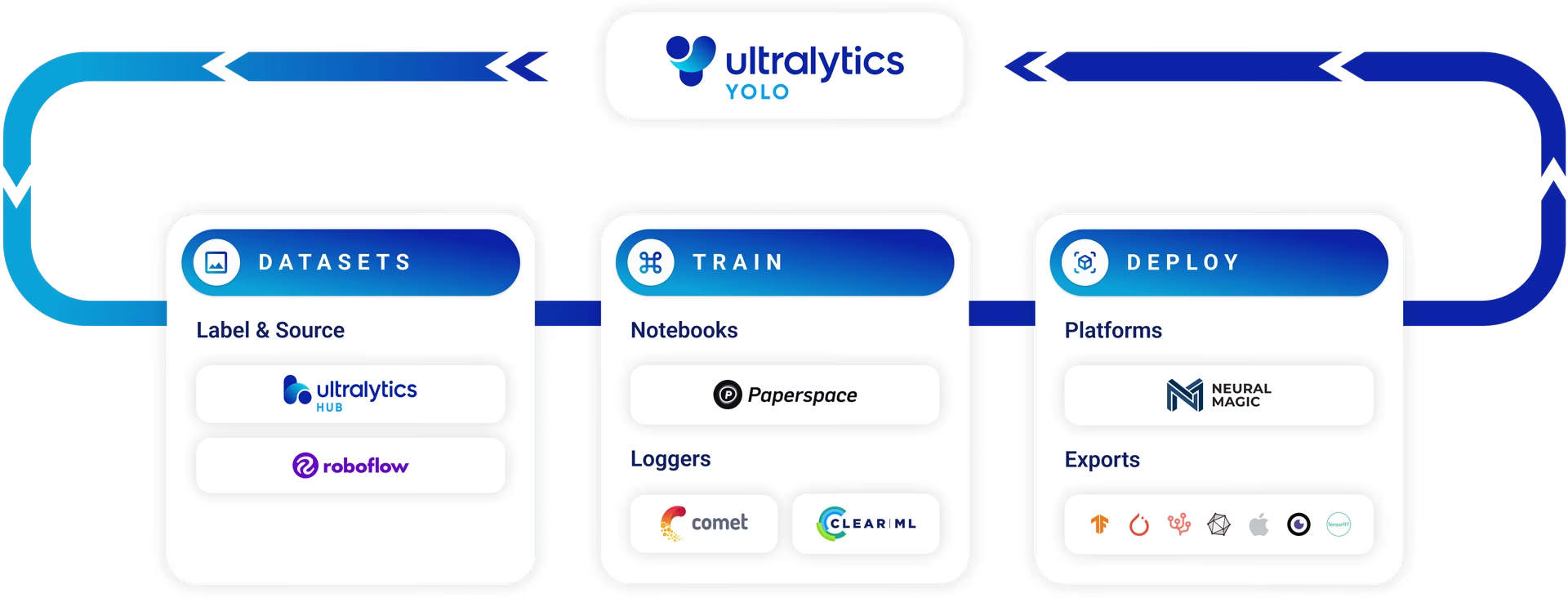Ultralytics YOLO26 モード

はじめに
Ultralytics YOLO26は単なる物体検出モデルではありません。データ取り込みやモデルトレーニングから検証、デプロイ、実世界でのtrackまで、機械学習モデルのライフサイクル全体をカバーするように設計された、多機能なフレームワークです。各モードは特定の目的を果たし、さまざまなタスクやユースケースに必要な柔軟性と効率性を提供するように設計されています。
見る: Ultralyticsモードチュートリアル:Train(トレーニング)、Validate(検証)、Predict(予測)、Export(エクスポート)、Benchmark(ベンチマーク)。
モードの概要
Ultralytics YOLO26がサポートするさまざまなモードを理解することは、モデルを最大限に活用するために不可欠です。
- Trainモード: カスタムまたはプリロードされたデータセットでモデルを微調整します。
- Val モード: モデルのパフォーマンスを検証するためのトレーニング後のチェックポイント。
- Predict モード: モデルの予測能力を実際のデータで解き放ちます。
- エクスポートモード: さまざまな形式でモデルのデプロイ準備をします。
- 追跡モード:オブジェクト検出モデルをリアルタイム追跡アプリケーションに拡張します。
- ベンチマーク モード: さまざまなデプロイ環境におけるモデルの速度と精度を分析します。
この包括的なガイドは、各モードの概要と実践的な洞察を提供し、YOLO26の可能性を最大限に引き出すのに役立ちます。
トレーニング
Trainモードは、カスタムデータセットでYOLO26モデルをトレーニングするために使用されます。このモードでは、指定されたデータセットとハイパーパラメータを使用してモデルがトレーニングされます。トレーニングプロセスでは、画像内のオブジェクトのクラスと位置を正確に予測できるように、モデルのパラメータを最適化します。トレーニングは、アプリケーションに関連する特定のオブジェクトを認識できるモデルを作成するために不可欠です。
Val
Valモードは、トレーニングされたYOLO26モデルを検証するために使用されます。このモードでは、モデルは検証セットで評価され、その精度と汎化性能が測定されます。検証は、過学習などの潜在的な問題を特定するのに役立ち、モデルの性能を定量化するために平均適合率 (mAP) などのメトリクスを提供します。このモードは、ハイパーパラメータの調整とモデル全体の有効性向上に不可欠です。
予測
Predictモードは、トレーニング済みのYOLO26モデルを使用して新しい画像や動画で予測を行うために使用されます。このモードでは、モデルはチェックポイントファイルからロードされ、ユーザーは推論を実行するために画像や動画を提供できます。モデルは入力メディア内のオブジェクトを識別し、位置を特定するため、実世界でのアプリケーションにすぐに利用できます。Predictモードは、トレーニング済みのモデルを適用して実際の問題を解決するための入り口です。
エクスポート
Exportモードは、YOLO26モデルをさまざまなプラットフォームやデバイスへのデプロイに適した形式に変換するために使用されます。このモードは、PyTorchモデルをONNX、TensorRT、CoreMLなどの最適化された形式に変換し、本番環境でのデプロイを可能にします。エクスポートは、モデルをさまざまなソフトウェアアプリケーションやハードウェアデバイスと統合するために不可欠であり、多くの場合、パフォーマンスの大幅な向上につながります。
追跡
Trackモードは、YOLO26の物体detect機能を拡張し、動画フレームやライブストリーム全体でオブジェクトをtrackします。このモードは、監視システムや自動運転車など、永続的なオブジェクト識別を必要とするアプリケーションにとって特に価値があります。Trackモードは、ByteTrackのような高度なアルゴリズムを実装し、オブジェクトが一時的に視界から消えてもフレーム間でオブジェクトの同一性を維持します。
ベンチマーク
Benchmarkモードは、YOLO26のさまざまなエクスポート形式の速度と精度をプロファイルします。このモードは、モデルサイズ、精度(detectタスクの場合はmAP50-95、分類の場合はaccuracy_top5)、およびONNX、OpenVINO、TensorRTなどのさまざまな形式での推論時間に関する包括的なメトリクスを提供します。ベンチマークは、デプロイ環境における速度と精度の特定の要件に基づいて最適なエクスポート形式を選択するのに役立ちます。
よくある質問
Ultralytics YOLO26でカスタム物体検出モデルをトレーニングするにはどうすればよいですか?
Ultralytics YOLO26でカスタム物体検出モデルをトレーニングするには、trainモードを使用します。YOLO形式でフォーマットされた、画像と対応するアノテーションファイルを含むデータセットが必要です。トレーニングプロセスを開始するには、次のコマンドを使用します。
例
from ultralytics import YOLO
# Load a pretrained YOLO model (you can choose n, s, m, l, or x versions)
model = YOLO("yolo26n.pt")
# Start training on your custom dataset
model.train(data="path/to/dataset.yaml", epochs=100, imgsz=640)
# Train a YOLO model from the command line
yolo detect train data=path/to/dataset.yaml model=yolo26n.pt epochs=100 imgsz=640
詳細な手順については、Ultralytics Train Guideを参照してください。
Ultralytics YOLO26はモデルのパフォーマンスを検証するためにどのようなメトリクスを使用しますか?
Ultralytics YOLO26は、検証プロセス中にさまざまなメトリクスを使用してモデルのパフォーマンスを評価します。これらには以下が含まれます。
- mAP (平均精度): これはオブジェクト検出の精度を評価します。
- IOU(Intersection over Union):予測されたバウンディングボックスとグラウンドトゥルースのバウンディングボックスの間の重複を測定します。
- Precision(適合率)とRecall(再現率):適合率は、真陽性検出の総検出陽性に対する比率を測定し、再現率は、真陽性検出の実際の陽性総数に対する比率を測定します。
検証を開始するには、次のコマンドを実行します。
例
from ultralytics import YOLO
# Load a pretrained or custom YOLO model
model = YOLO("yolo26n.pt")
# Run validation on your dataset
model.val(data="path/to/validation.yaml")
# Validate a YOLO model from the command line
yolo val model=yolo26n.pt data=path/to/validation.yaml
詳細については、Validation Guideを参照してください。
YOLO26モデルをデプロイメント用にエクスポートするにはどうすればよいですか?
Ultralytics YOLO26は、トレーニング済みのモデルをONNX、TensorRT、CoreMLなどのさまざまなデプロイ形式に変換するエクスポート機能を提供します。モデルをエクスポートするには、次の例を使用してください。
例
from ultralytics import YOLO
# Load your trained YOLO model
model = YOLO("yolo26n.pt")
# Export the model to ONNX format (you can specify other formats as needed)
model.export(format="onnx")
# Export a YOLO model to ONNX format from the command line
yolo export model=yolo26n.pt format=onnx
各エクスポート形式の詳細な手順は、エクスポートガイドに記載されています。
Ultralytics YOLO26のベンチマークモードの目的は何ですか?
Ultralytics YOLO26のBenchmarkモードは、速度と 精度 ONNX、TensorRT、OpenVINOなどのさまざまなエクスポート形式に対応しています。モデルサイズなどの指標を提供します。 mAP50-95 オブジェクト検出、およびさまざまなハードウェア構成での推論時間について説明し、お客様の展開ニーズに最適な形式を選択するのに役立ちます。
例
from ultralytics.utils.benchmarks import benchmark
# Run benchmark on GPU (device 0)
# You can adjust parameters like model, dataset, image size, and precision as needed
benchmark(model="yolo26n.pt", data="coco8.yaml", imgsz=640, half=False, device=0)
# Benchmark a YOLO model from the command line
# Adjust parameters as needed for your specific use case
yolo benchmark model=yolo26n.pt data='coco8.yaml' imgsz=640 half=False device=0
詳細については、Benchmark Guideを参照してください。
Ultralytics YOLO26を使用してリアルタイムの物体trackを実行するにはどうすればよいですか?
Ultralytics YOLO26のtrackモードを使用すると、リアルタイムのオブジェクトtrackが可能です。このモードは、物体detect機能を拡張し、動画フレームやライブフィード全体でオブジェクトをtrackします。trackを有効にするには、次の例を使用してください。
例
from ultralytics import YOLO
# Load a pretrained YOLO model
model = YOLO("yolo26n.pt")
# Start tracking objects in a video
# You can also use live video streams or webcam input
model.track(source="path/to/video.mp4")
# Perform object tracking on a video from the command line
# You can specify different sources like webcam (0) or RTSP streams
yolo track model=yolo26n.pt source=path/to/video.mp4
詳細な手順については、Track Guideをご覧ください。